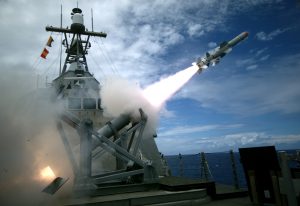The U.S. State Department has given the greenlight for Taiwan to buy hundreds of truck-mounted anti-ship missiles that would improve its ability to fend off a potential invasion fleet coming across the Taiwan Strait from China.
Foreign arms sales must be approved by the U.S. State Department and sales to Taiwan are especially sensitive since the United States switched its recognition from the Republic of China to the People’s Republic of China on the mainland in 1979. The Taiwan Relations Act permits the United States to provide defensive weapons to Taiwan to enable it to defend itself against coercion and threats.
Taiwan requested to purchase 100 truck-mounted coastal defense launchers and 400 of the U.S. Navy’s Harpoon anti-ship missiles.
Taiwan produces its own highly capable, supersonic coastal defense missiles, the Hsiung Feng III, believed to have a range of over 200 nautical miles and be capable of travel at more than two times the speed of sound.
By contrast the Harpoon missile, introduced in the late 1970s, travels at high subsonic speeds and has a range of only 67 nautical miles. The upgraded missiles that Taiwan intends to purchase have improved guidance systems to improve its ability to hit land targets and targets close to shore in addition to its traditional anti-ship mission.
The Taiwan Strait is about 100 nautical miles across at it widest, and 70 nautical miles at its narrowest.
The Harpoon’s range means that Taiwan could use it to cover most of the Taiwan Strait but not strike targets on China’s mainland, making it a mostly defensive weapon in any potential cross-strait clash, and possibly limiting a crisis from escalating.
The Harpoon sale is the largest part of an enormous package of defense contracts approved recently. In the past few weeks Taiwan has also been approved to purchase airborne reconnaissance systems, 11 High Mobility Artillery Rocket Systems (HIMARS), and 64 Army Tactical Missile Systems, as well as 135 extended-range Standoff Land Attack Missiles.
A former senior Trump administration defense official said earlier this fall that despite making major improvements in its amphibious warfare capabilities, China is still unlikely to mount a traditional invasion of Taiwan because of the extraordinary difficulty of moving enough troops across the Taiwan Strait and then fighting their way across Taiwan’s challenging, mountainous terrain.
Large numbers of Harpoon missile batteries and other coastal defense missiles staged along its coastline would make it extremely dangerous for Chinese troop-carrying amphibious ships to cross the strait, as they are larger, slower targets with less advanced defensive systems than the PLA Navy’s new destroyers and cruisers. If ships did make it across the strait, weapons like the HIMARS could be used against landing ships close to shore and large formations of troops on beaches.

































